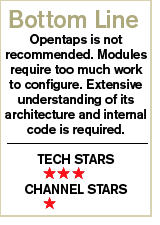Review: Apache A Work In Progress
Software application framework
The CRN Test Center set out to review Apache's open-source ERP code to see how far the product has matured since last year [CRNtech, Feb. 26, 2007]. Given the limitations of a barebones framework, reviewers went to Opentaps, another open-source development project that is building ERP and CRM applications that incorporate the OFBiz framework. The product's code and binaries are accessible at Sourceforge.net.

Opentaps' 1.0.0 preview version of its open-source ERP and CRM offers many standard features, including content management and some business intelligence reporting through JasperReports and Pentaho. Opentaps even has e-commerce and general ledger modules so that customers can integrate any custom business process on a single platform.
Installing Opentaps was relatively simple. Java runtime was the only major requirement to get it going on Windows. Users do have to figure out some paths on the command line because they are missing from the documentation, but the steps are simple.
Creating a Web store with all the usual e-commerce features is as easy as clicking the New Store button. Unfortunately, Opentaps steers users to configure its modules around its Web store. From the start, product inventory is driven by saving parts to an online store. All other elements such as employees, company and partner information, warehousing and shipping must be updated using inside know-how of its configuration and database structure.
Based on the current documentation, reviewers don't see any way around the professional services offered by Opentaps. It charges $150 per user per year with a minimum of 10 users for professional support. The support only covers standard tech support incidents. A commercial license starts at a minimum of $5,000 per year for five users.
Right now, the user guide and startup documentation only provide minimal interaction with the suite. The modules desperately need wizards or some initial configuration steps. Migrating business documents from Microsoft Excel, Intuit QuickBooks and other sources is not for the faint of heart. The XMPL-based import tool, for instance, only accepts data that fit a model. Data migration requires batch programming and many intermediate databases. Bridging records across modules is also daunting.
Opentaps does provide a macro-based model to simplify the OFBiz Java code. The Opentaps API provides form widgets, tables and Ajax-based page refreshes. But technical documentation is poor at best. The reference material, code samples and module testing are better suited for quality assurance testers. Opentaps mixes OFBiz developer-centric documents with its application API. Reviewers analyzed some of the JavaDocs application APIs and found almost no information on class and method usage. Moreover, the documentation from Opentaps doesn't match information from the Sourceforge site.
Reviewers don't recommend the product as it stands at version 1.0.0. It would be an expensive exercise for VARs to deploy, requiring countless man-hours to get everything to work correctly. The OFBiz framework is still evolving and needs to keep doing so to compete with other open-source solutions. Today, Opentaps depends too heavily on work done by the OFBiz community.